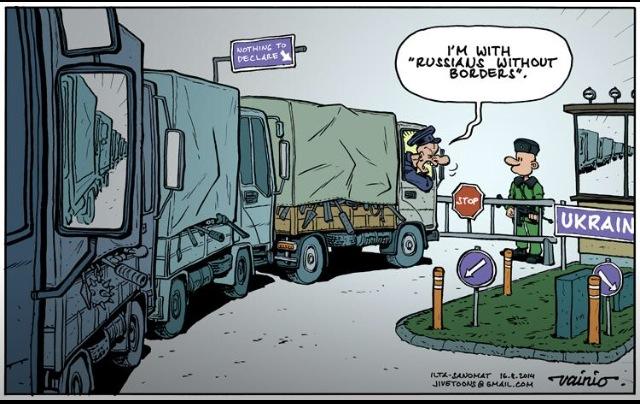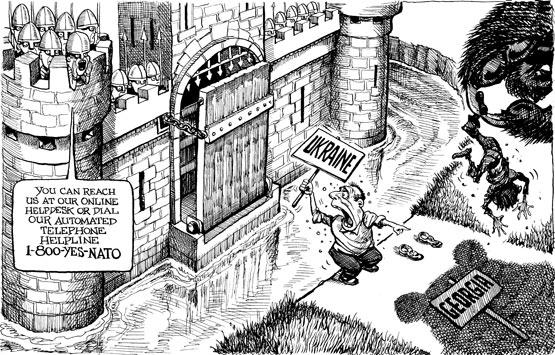By JOHN BOLTON - Op-Ed

Alone in the Oval Office, US President Barack Obama leans back in his chair
American and European stock markets have been jumpy for weeks as they contemplate possible armed conflict between Russia and Ukraine. Inside Ukraine, certainly, Kiev's forces have been pushing back separatists supported by Moscow , and they've been surprisingly successful in the eyes of many, perhaps including Moscow, and have thus increased fears of a more direct Russian intervention. But while rumors of clashes last week contributed to the latest burst of market volatility, evidence of actual hostilities between national armies is scarce.
Ironically, while Western capital markets remain attentive to Ukraine's future, President Obama seems detached and uninterested. Indeed, the president appears removed not only from Ukraine, but from the chaos across the Middle East. But lazy summer days on Martha's Vineyard cannot obscure the reality of Russia's continuing efforts to dominate the independent countries that were formerly part of the Soviet Union.
The stakes remain extraordinarily high for the United States, Russia and Europe. Ukraine's size, potential economic strength and strategic location make it a big prize for Russian President Vladimir Putin, determined as he is to reassert Russia's "rightful" role on the world stage. Though Putin is hardly prevailing in Ukraine today, his position will significantly improve if the West loses its focus, its willpower or both. And that is exactly what's now happening.
Despite the attention received by Putin's apparent propaganda gambit of an "aid convoy" for Ukraine, and the speculation about whether the trucks were actually ferrying weapons to the separatists, Russia's Plan A is not to acquire more Ukrainian territory by force. Instead, Putin wants Kiev's government to be compliant with Russian interests and demands, to not drift too far from Moscow economically or politically.

Russian "aid convoy".
Though Putin is hardly prevailing in Ukraine today, his position will significantly improve if the West loses its focus, its willpower or both.
-
Despite the subsequent annexation of Crimea, Putin misplayed his hand in November when he caused the basically pro-Russia Viktor Yanukovich government to fall from power, thus necessitating, after considerable turmoil, elections that produced a far less submissive government in Kiev. He has been trying to recoup his losses, knowing he has the high cards economically, given Russia's critical oil and gas sales to Ukraine. Western sanctions have barely altered Putin's calculus. Instead, Europeans fret about sanctions' negative effects on their own economies, and last week, Ukraine's currency fell to a record low against the dollar.
But just because Putin isn't interested in formally acquiring more territory, it doesn't mean he isn't arming, financing and probably directing the pro-Russia separatists. His aim is to raise the specter of partition but not to actually precipitate it unless, in his view, it becomes the only feasible way to protect Russia's frontier interests. Putin must know that if he seizes more territory, the rump Ukraine would inevitably join NATO and the EU, remaining implacably hostile to Moscow for the foreseeable future. Instead of annexing half and making an enemy of the rest, he prefers a neutered but whole Ukraine on Russia's western border. That is what Putin will seek when he meets next week with Petro Poroshenko, Ukraine's new president.
So why did Putin annex Crimea? It certainly didn't solve his Ukraine problem, because it altered Ukraine's electoral balance to Russia's disadvantage. On the other hand, it was hugely popular in Russia, thus strengthening Putin at home. Unfortunately, the West's pathetically inadequate response to Crimea's annexation undoubtedly convinced Putin that, if it came to that, he could get away with hiving off more Ukrainian territory, at an acceptably low cost, even if that represents a less-attractive Plan B.
According to White House briefings, Obama has repeatedly upbraided Putin for violating international law. Coupled with sporadic, unsystematic, poorly enforced economic sanctions, this may impress Obama's acolytes, but it has precisely the opposite effect on Putin. He sees American weakness and retreat.

Although the hour is very late, the U.S. still has time to respond unequivocally, staking out a position of strength. Dismembering Ukraine against its wishes is unacceptable. Washington should supply Kiev with weapons and other assistance, while also reviving President George W. Bush's 2008 plan to fast track Ukraine for NATO membership.
By so doing, the U.S. would eliminate the zone of ambiguity between the North Atlantic Treaty Organization and Russia that Putin is exploiting, even if Obama's flaccid leadership has tragically lost Crimea for good. Precisely by establishing the kind of effective deterrence that has convinced Russia not to use military force against NATO since its creation, we can prevent future outbreaks of Russian aggressiveness, as yet unanswered in today's crisis, elsewhere along its borders.
And there is more than just Russia to consider. China, making territorial claims in the South and East China Seas, nuclear-weapons proliferators like North Korea and Iran, regional troublemakers like Venezuela, and terrorists and their state sponsors worldwide all see the same pattern. A weak America does not lead to a more peaceful world, but to exactly the opposite.
-----------------------------------------------

No comments:
Post a Comment